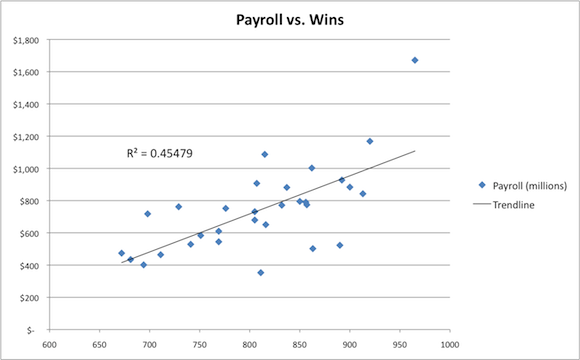Did you know that, during the last decade, all but seven teams reached the playoffs? And did you further know, that during the 2000s, 19 of baseball’s 30 teams reached the playoffs more than once? Never mind the fact that eight of 30 teams make the playoffs every year; that’s parity!
Or at least it is if you’re ESPN’s Senior Editor David Schoenfield. In the companion piece to his crazy realignment scheme, Schoenfield spent yesterday’s Hot Stove U. column writing about parity in baseball. Schoenfield starts with the proposition that baseball has a competitive balance equal to or greater than that of the NFL, and then he finds some proof.
From the get-go, Schoenfield’s proof isn’t what we would call rigorous. Baseball enjoyed eight different World Series champs in the 00’s while football has seen six or maybe seven Super Bowl champions. “Baseball has more champions, nearly half of its 30 teams have reached the World Series, and more than two-thirds have played in a league championship series,” he writes. “The NFL totals are clearly similar.”
Schoenfield goes on and on about baseball’s maybe, not-quite-there competitive edge and even manages to talk about how money helps. He writes:
There is no denying that a correlation exists between payroll and success (good players, after all, generally cost more money). Check out the table below. Of the 10 teams that won the most games in the decade, six were in the top 10 in total payroll. Of course, payroll is not the sole determining factor in winning, as many pundits want you to believe. The Twins and A’s both made the playoffs five times in the decade, and the team that spent the smallest amount, the Marlins, won a World Series. And market size is not always a direct line to payroll. St. Louis plays in the 20th-largest market, smaller than Minneapolis, Denver, San Diego or Cleveland, and not much larger than Tampa or Pittsburgh. Of course, the Cardinals are often wrongly portrayed as a large-market franchise simply because they are successful.
Notice the number of times Schoenfield turns to the one-offs. Yes, the Marlins won the World Series, but they did so not with the lowest payroll but with the 20th lowest figure. They are an outlier and not even an unreasonable one at that. Media market size, meanwhile, doesn’t matter as much as Schoenfield would have you believe because baseball revenues are driven by in-stadium finances and reach. The Cardinals might play in the relatively small St. Louis, but their popularity and reach extend well beyond the borders of that Midwestern city.
Schoenfield is right about one thing here though: There is a correlation between money and winning. Take a look at this table reproduced from numbers the ESPN scribe provides:

The best-fit line returns an R-squared of 0.45. This suggests a fairly strong correlation, over the span of 10 years, between wins and money spent on payroll. It doesn’t imply causation, and money isn’t the only factor in winning. But in terms of an argument for parity, this graph one doesn’t help the cause. Outliers will win; small-market, low-payroll terms will get lucky now and then; but money will come out on top more often than not.
It’s easy, in the end, to link this to the Yankees. That mark in the upper right-hand corner — the one with more wins and more dollars spent than anyone else — represents the Yanks, and as the 2003 Marlins skew the data, so do the Yankees. Without them, the R-squared drops to 0.36, still a reasonably strong indication of correlation but one that definitely allows for other factors. Of course, with the Yanks making the playoffs nine out of ten times, that leaves just seven spots for the other 29 teams, and any edge can help.
So is there parity in baseball? I don’t think so, and I believe Schoenfield overstates his case. Money can still get you places. Whether that is a bad, though, is an entirely different question all together.
Leave a Reply
You must be logged in to post a comment.